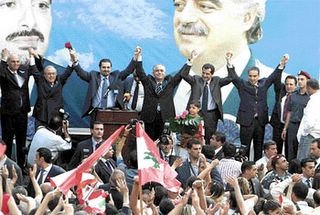Lebanon: The Stroll of Democracy

Hariri

Update 29 May: Voter turnout approximately 27% with abstentions among the Armenian community.
The march of democracy in Lebanon will be more of a stroll because the results of the election, beginning tomorrow and running through June 12th, are already known. The voting districts are confessionally apportioned and the political parties which represent them are aligned with the district. Despite the massive 13 March demonstration of national unity calling for the pullout of Syrian troops, voter turnout for the elections is expected to be below 40%. In certain Christian fiefs, voter turnout may well be below 25%.
The 128 seats in Parliament are divided 50-50 (64-64) between Muslims and Christians, even though Muslims account for 58.7% of the electorate. Maronite Christians, representing less than one-quarter of the population, are gathered around the "pole" of Cardinal Sfeir and are alloted 34 seats while other Christian communities, of which there are a-plenty--Greek Orthodox/Catholic, Armenian Orthodox/Catholic, Syrian Orthodox/Catholic, Chaldean Orthodox, Nestorians, Latin Catholics and Protestants--account for the rest. The Sunnis are guaranteed 27 seats, with the remaining 37 seats divided between the Shi'a and the Druze.
The political landscape is very much one of oligarchs, clans and clerics. Billionaire Saad Hariri is the undisputed leader of Lebanon's Sunni community. The Jumblatt family heads up the left-leaning Druze while the clan of Yazbaki Druze is led by the Arslan family. The Shi'a are split into two movements: the moderate Amal headed by Nabih Berri and the hardline Hezbollah, led by Sheikh Hassan Nasrallah.
Opposition parties, i.e. those who prefer drastically weaked links to Syria, will end up with control of 2/3 of the seats in Parliament. Meanwhile the pro-Syrian Shi'a will maintain their dominance in Southern Lebanon where they are expected to win 23 seats. The only real contest is a rather fearful one: General Michel Aoun will challenge mainstream opposition candidates in heavily Maronite districts in the mountains. This contest is scheduled for 12 June.
Incidentally, pro-Syrian does not translate as Sunni Muslim or even anti-democratic. Emil Lahoud, a Lebanese Maronite Christian patriot through and through, is the current President and considered by some to be Syria's man. His brother, by the way, is Supreme Court chief justice. Shi'ite leader Nabih Berri, born in Sierra Leone, aligned his militia, Amal, with Syria during the civil war. Sunni Premier Nagib Miqati, a telecommunications CEO, is a personal friend of Bashir Assad but a respected reformer and modernizer. Meanwhile pro-Syrian Sheikh Hassan Nasrallah of Hezbollah, born in a shantytown, is a graduate of the Shi'a seminary in Najaf. He is charismatic, politically astute and has forgone any idea of an Islamic state. His spiritual mentor, Abbas Al-Mussawi, was assassinated by the Israelis. It can be assumed that he remains rather unforgiving.
The opposition includes Christians, Druze and Sunni Muslims. Maronite Michel Aoun is a character Lebanese should run away screaming from. He was supported by none other than Saddam Hussein in his personal bloody war to end the Syrian occupation. He was quickly defeated and dispatched to exile in France. Druze leader Walid Jumblatt, once a playboy and a ladies' man, defended his people from the Maronite right wing and was a friend of Yassir Arafat. Jumblatt is outspoken, pragmatic and a defender of secularism yet unwilling to pursue an immediate challange the Shi'a militias. He is one of the point men of the opposition. Saad Hariri is a wealthy, handsome, 35 year-old Sunni whose list is going to vacuum up every Sunni vote in the country. But he is a novice and has inherited, besides his father's billions, his father's political advisors.
As to who killed Rafik Hariri? Cui bono? In my opinion, it must have been some people who knew that popular ire would focus on the Syrians and hasten their withdrawal. The French? No, they had pretty much clinched a deal with Assad for a spring pullout. The Syrians? Unlikely to shoot themselves in the foot. Hezbollah? No one was seriously challenging them. In my book, prime suspects are 1) the Aounistes and 2) the United States. But what do I know?


1 Comments:
Aoun's website posted photos of the Hariri bomb blast and said it was an underground explosion immediately after the keilling 7-10 hrs...then they and the comments disappeared.
To date even though they have had the benefit of the wisdom of an Irish Policeman and plenty of time we still don't know if it was a
1. stationery bomb
2. moving car
3 moving lorry
4 underground explosion
or a suicide mission of either 1,2,3
It was US/ Mossad inspired but they could have hired anybody. But then what do I know ?
Post a Comment
<< Home